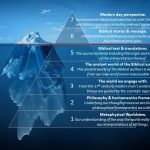Philosophy
Immanuel Kant
and Christian Apologetics
Published on October 16, 2024
by Willie Mc Loud
In this essay I reflect on some aspects of the philosophy of Immanuel Kant, especially insofar as he has been misinterpreted by Christian philosophers and apologists.
The philosopher Immanuel Kant (1724-1804) is one of the most important philosophers in the history of philosophy; his philosophy does however provide the reader with “grave hermeneutical difficulties” [1]. In his Critique of Pure Reason (A 1781; B 1787), Kant established the basis for epistemological claims about objective knowledge, laying the philosophical foundation for mathematical science.
Most Christian philosophers have an ambivalent attitude towards Kant. Among Christian apologists this view is often quite negative, for the most part due to two reasons, namely the supposed damage that his critique of the traditional arguments for God, especially the ontological argument, has caused the Christian faith, as well as the implications that these scholars derive from the idealist interpretation of Kant’s philosophy. But does that mean that Kant should in fact be viewed in negative terms by Christians and apologists in particular?
In this essay I will touch upon both these longstanding criticisms of Kant, showing that they do not withstand scrutiny [2].
Kant’s Critique of the Classical Arguments for the Existence of God
In Christian apologetics, especially classical apologetics, three basic proofs or arguments for the existence of God play an important role. These arguments are the ontological argument, the cosmological argument and the teleological argument. The ontological argument concerns the existence of God, the cosmological argument the idea of a first cause and the teleological argument the idea of a designer of the cosmos.
For the purposes of this essay only the ontological argument is important. In its earliest formulation, the argument reads:
“God is a being which has every perfection. (This is true as a matter of definition.) Existence is a perfection. Hence God exists.”
As the ontological argument forms the capstone of the mentioned arguments, the power of the other arguments is dramatically reduced if it fails. Kant’s main problem with the ontological argument positing the existence of God as a logical necessity was that “a pure concept of reason” could never necessarily imply existence (A594/B622). A concept is but a concept; it does not necessitate existence. This was exactly what Kant has set out to show in his Critique of Pure Reason, namely that pure reason could never arrive at such conclusions as far as reality (existence) is concerned when applied beyond the bounds of the senses. After and as a result of Kant’s criticism, the “proofs” lost their power and influence.
What is in fact important to note is that Kant was himself a Christian, having been raised as a pietist, who actually presented other arguments for the existence of God based on his transcendental philosophy, called “transcendental arguments”, the most important of which is the moral argument [3]. Kant basically argued that the existence of morality presupposes the existence of God. Having lived in the great epoch of reason, when human reason was valued above all the other human qualities, Kant pursued a “rational” faith [4]. Although Kant’s views in this regard are too rationalistic for contemporary Christians, we do find that a “reasonable faith” is often emphasised by Christian apologists.
What Kant sought to achieve with his philosophy (among other things) was to establish the limits to knowledge “in order to make room for faith” (Bxxx). In Kant’s moral philosophy, the so-called noumenal realm, derived from the Platonic concept of an intelligible realm (as Kant himself observed in his Metaphysical Foundations of Natural Science (1786) [5]), plays a central role. The name “noumenal” is derived from the Greek word for mind, “nous”, as this realm could only be envisioned in the mind, beyond the possibility of empirical access. Kant postulated that the possibility of human freedom, “practical reason” and free will and thus human responsibility with regard to morality, resides in this realm.
The outcome of this distinction in Kant’s philosophy entails a dichotomy, according to which the empirical world of science is separated from the moral world. Whereas the scientific world falls within the realm of experience and empirical observation, the moral world would exist beyond the possibility of empirical access. Even though the existence of God (as well as the soul and all things pertaining to the spiritual dimension of Christian belief) could therefore never be empirically confirmed, Christians can nonetheless believe in him without compromising their scientific viewpoint. For Kant, science and Christian belief is not in conflict with each other; they belong to two very difference domains of human existence.
Although some philosophers of religion find this way of “saving” faith acceptable, it in actual fact removed all moral issues from the empirical world of human existence (It could even be viewed as a form of the “God in the gap” argument). As a consequence, when scientists and scientifically inclined philosophers rejected the possible existence of the noumenal realm, it also signalled a rejection of the basis for normative morality as well as morality having a divine basis and thus Kant’s moral argument.
Kant’s Idealism and Reality
Kant has also been criticised by Christian apologists for his idealism.
In an interpretation of Kant’s philosophy propagated by the philosopher Peter Strawson (The Bounds of Sense; 1966), Kant is read solely in idealist terms. This view is typically called the “two-object” interpretation of Kant. It understands “things in themselves” (as they really exist beyond human perception) as referring to the everyday objects of our senses considered outside our cognition of them, i.e., the unknowable “real” things (in the world as it really is) which stand in contrast with the representations in our “mental realm” (mind).
In this reading of Kant, his view is grouped together with “subjectivism”, for example in Peter Kreeft and Ronald K. Tacelli’s Handbook of Christian Apologetics (1994), who express a major concern that truth is severely compromised in Kant’s idealism as we find in expressions of postmodernism. In subjectivism, truth is subjective and depends on each person’s perspective, with “universal objective truth” [6] being negated. This conclusion is based on the view that Kant believed that “all knowable content [of things in themselves] came from us”.
Similar views are expressed in Etienne Gilson’s The Unity of Philosophical Experience (1937) and more recently by Norman Geisler’s Baker Encyclopedia of Christian Apologetics (1999) and other books on apologetics. In this reading of Kant it is assumed that he gave up on our ability to know reality. We can only know things as they appear to us, not as they are in themselves. “Reality or the thing in itself, including God, is forever beyond us.” This is then described as a “philosophical agnosticism”; we can never know that God exists.
A major problem for conversations about Kantian philosophy is that most Christian Kantian philosophers have a paradigmatic commitment to the two-object view and are not open to other interpretations of Kantian philosophy (they are quite convinced that they are correct in their understanding of Kant’s position). However, the aforementioned interpretation of Kant’s philosophy is not the only one or even the most widely accepted interpretation of the Kantian position in the academic philosophical community.
Another significant interpretation of Kant is the so-called “two-aspect view” because Kant is interpreted as saying that the same things that we encounter in experience (and experiment) are taken from two different standpoints, namely as they appear to our senses (adhering to the epistemic conditions of cognition) and as we can conceive of them beyond the bounds of the senses as things in themselves. As this position is well documented and entire volumes had been written on it (such as Henry E. Allison’s well-known Kant’s Transcendental Idealism: An Interpretation and Defense (2004)), there is surely no need to reargue that position here. I will only give a broad overview, especially pertaining to the question of objective knowledge and truth.
In this view Kant is interpreted as saying that the things that appear to our senses are in fact empirical reality (albeit not ultimate reality). Kant indeed asserts that his philosophy does not only involve “transcendental idealism” but at the very same time and in the same measure, “empirical realism”. Kant writes: “[T]he transcendental idealist is an empirical realist, and grants to matter, as appearance, a reality which is not inferred, but is immediately perceived.” (A372; my emphasis) Kant is therefore also a realist! [7]
This means that humans do not give “form” to reality (as per the two-object view); reality has its own form that is empirically given in the senses. Things as they are in themselves, however, are unknowable in the sense that they are (per definition) beyond empirical reach. Even though previously unknown things come within empirical reach in the progress of science, some aspects of things would still remain that are not yet so accessible or that can in certain contexts even forever be inaccessible (like quantum entities in the pre-measurement phase before measurement); these are things in themselves.
In this interpretation of Kant, objective knowledge and truth are indeed secured. Even though as humans we can never have anything but a human view on the world, which is the basic insight of Kant’s “Copernican turn”, our experience and experimental observations can in fact establish “objective” knowledge. This happens when the “determinate judgment” is made that our empirical intuition of things (discovered in experience and experiment) correspond with our concepts of them (expressed in scientific theories), i.e. when the particular conforms to the rule. Our empirical intuition concerns empirical data given in “pure” intuition and observed via the senses. It can be extended beyond the crudeness of our human senses through scientific apparatuses.
This understanding of knowledge explains why Kant is regarded as laying the philosophical foundations for mathematical science, not only of Newtonian science but even of later mathematical science insofar as his views have influenced physics as a discipline [8].
Knowing God
As for our knowledge of God and spiritual things, they do indeed lie beyond our empirical reach and we can therefore not have empirical knowledge of them. This conclusion is quite basic: Humans could not have any empirical knowledge of God given in our physical senses. In fact, we could also not gain knowledge of God though pure or speculative reason as Alvin Plantinga (who discusses both Kantian interpretations in an evenhanded manner) puts it: “[Kant] often seems to suggest that the problem is not that we can’t think about God but that we can’t come to speculative or metaphysical knowledge of God.” [9]
We can for heuristic purposes compare the impossibility of obtaining empirical knowledge of God with the Big Bang, which also lies outside empirical reach. Even though the effects of the Big Bang can be observed empirically, the Big Bang itself is forever outside the possibility of empirical observation. Our “knowledge” of the Big Bang is based solely on secondary observations and is thus not empirical knowledge of the Big Bang itself. In the same way it can and has be argued that “knowledge” of God can be based on secondary observations such as his design in the cosmos etc. (Rom. 1:20)
It seems that the idealist interpretation stands behind the Stanford Encyclopedia of Philosophy listing Kantian philosophy as a “precursor” to postmodernism. Even if this view is allowed (which the two-aspect view will dispute), his view does not have any relation whatsoever with this latter philosophical view (which for the most part, since Nietzsche, was a reaction against Kant). What Kant did was to undermine philosophical modernism [10] and as such could be viewed as a significant step away from modernism. However, his view as expressed in the two-aspect interpretation does not in any way counts as subjectivism. In fact, as I have shown, his philosophy established the basis for obtaining “objective” knowledge about the empirical world. Rather, Kant’s view should instead be read as evading the pitfalls of both modernism and postmodernism.
Kant’s negation from the modernist idea of humans obtaining absolute objective knowledge follows from his view that both humans as well as the objects of their experience and observation are grounded in a deeper unknown aspect described by the term “things-in-themselves”. We do thus not have any absolute objective knowledge about the true reality of things. On the other hand, objective knowledge (also called “truth”) as we find in the empirical sciences, is secured by the fact that the empirical data conforms to conceptual and mathematical theories. Kant does not undermine “truth”; he simply rejects the idea that any form of absolute and final Truth can be obtained through empirical means. This is a far call from the postmodernist view that truth is subjective. For Kant we have no other way to engage with the world than what our human senses allow us, but that does not in any way imply “subjectivism”.
About all the problems that Christian philosophers and apologetics ascribe to Kant in this regard (and also other so-called inconsistencies and incoherencies) are eliminated and negated if the two-aspect interpretation is assumed instead of the two-object interpretation, which strongly suggests that the problem lies not with Kantian philosophy but with the wrong interpretation thereof.
Notes
[1] Plantinga, Alvin. Warrented Christian Belief (Oxford University, 2000).
[2] In this essay I am only concerned with Kant’s so-called critical philosophy.
[3] For a discussion of “Kant’s Arguments of God’s Existence”, see John-Michael Kuczynski (PhilArchive; 2020).
[4] For a detailed discussion of Kant’s “Philosophy of Religion”, see this entry in the Stanford Encyclopedia of Philosophy.
[5] Kant actually identifies his noumena with Leibniz’s monads of which he wrote: “[Monadology] is rather an intrinsically correct Platonic concept of the world devised by Leibniz… he asserts nothing but what has been shown elsewhere [i.e., in Kant’s own writings]” (MAN 4:507-508). For a discussion, see McLoud, p27 (2018).
[6] Kreeft, Peter and Tacelli, Ronald K. Handbook of Christian Apologetics, p372 (IVP Academic, 1994).
[7] For a detailed discussion of the empirical dimension in Kant’s philosophy, see Allais, L. (2004) ‘Kant’s One World: Interpreting “Transcendental Idealism”’, British Journal for the History of Philosophy 12(4): 655-684.
[8] Friedman, M. Dynamics of Reason (Standford: CSLI Publications, 2001). Pringe has shown how Niels Bohr’s interpretation of quantum mechanics is also based on Kant’s philosophy of science: Pringe, H. Critique of the Quantum Power of Judgment. A Transcendental Foundation of Quantum Objectivity (Berlin: Walter de Gruyter, 2007).
[9] Plantinga, Alvin. Warrented Christian Belief, p 17 (Oxford University, 2000).
[10] Philosophical modernism is a name applied retrospectively to the philosophical view that humans have direct and unconstrained access to reality and could therefore know things absolutely objectively.
Willie Mc Loud is an independent South African scholar with a wide field of interest spanning ancient Middle Eastern studies, Kantian philosophy and philosophy of science. He has got a PhD in Nuclear Physics (Nuclear Fusion), a MSc in Physics, a MA in Philosophy of Science, an Honours degree in Philosophical Hermeneutics and an MBL.




